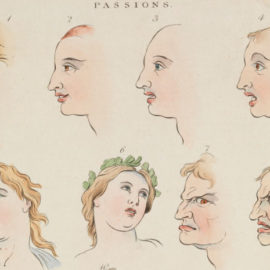

This article is an excerpt from the Shortform book guide to "The Road Less Traveled" by M. Scott Peck. Shortform has the world's best summaries and analyses of books you should be reading.
Like this article? Sign up for a free trial here .
Is grace real? What is the evidence of grace?
According to psychiatrist M. Scott Peck, the evidence of grace is resilience, synchronicity, the unconscious, and evolution. In The Road Less Traveled, Peck offers that, if we reflect on the evidence of grace, we become more open to receiving it. This is critical for spiritual growth.
Keep reading to learn about the evidence of grace from Peck’s perspective.
The Evidence of Grace
One way to become more open to grace is to reflect on the evidence of its existence. What is the evidence of grace?
Evidence #1: Physical, Mental, and Spiritual Resilience
Psychology can explain exactly how mentally ill patients came to be mentally ill, but oftentimes there are patients who, based on their traumatic experiences, should be more severely mentally ill than they actually are. These people often, despite experiencing terrible traumas, grow, and excel immensely in their lives. Additionally, we know quite a bit about the causes of diseases that are physical, but not much about the causes of physical health. Why do some get sick while others remain healthy? The medical world calls this “resistance,” asserting that the body is simply defending itself well against illness. But why? How? When someone falls ill, can it be that the forces that often protect us simply failed to operate in this person?
How about automobile accidents in which the car is twisted into a pretzel but the occupant escapes unscathed? Alternatively, consider people who go through a series of unfortunate events and terrible things keep happening to them one after another. Why are they so accident-prone or subject to “bad luck?” Many explain survival as instinct, but while we know of instinct, we know little about what drives instinct. We tend to accept that instinct is a product of a mechanism from within the individual, initiated by external stimuli. However, we can’t explain how, when someone survives an accident that should have killed them, instinct as a mechanism could be the reason. Does the car instinctively protect the human? Does the human in the car instinctively mold their body so they’re unharmed?
On the subject of evil, for every evil experience, there are countless people who react to that evil by becoming enlightened. Experiences of evil expand your awareness and show you where not to go. The miracle, therefore, is not in the failure of the resistance system in some, but the thriving of the resistance system in most. For physical, mental, and spiritual health, it appears that there is a force that protects and facilitates our growth even after horrific experiences. We know little about how or why this is the case. However, it can be suggested that phenomena like freak accidents with no injuries might be explained by aspects of grace, such as synchronicity and the unconscious, and therefore serve as evidence of grace.
Evidence #2: Synchronicity
The principle of synchronicity details the potential of unlikely occurrences that arise with unexplainable frequency and defy natural law. Timing is the most intriguing factor, as often these types of events occur at a time or with a frequency that is significant in some way.
Serendipity is defined as the ability to locate meaningful, positive occurrences, and a skill you can hone to tune into manifestations of grace. Occurrences of serendipity arise all the time, but most choose to view them as chance or coincidence and do not ascribe any deeper meaning or significance to them. Because of this, we derive no value from them either. This relates directly to grace, as grace is specifically defined as something that is available to all, but not all are open to. If you don’t experience it, it is likely that you are not seeking it, or are not open to it arising.
For example, let’s consider the survival of a freak car accident. There is no natural law that demonstrates how a car could change form in such a way that the occupant remains unharmed, nor a law that demonstrates how the occupant could influence the car to change form in such a way that they remain unharmed. Despite this, somehow, the car and the occupant can change form in such a way that the occupant remains unharmed. This kind of event occurs a lot more often than can be explained by chance, and the timing seems to be a significant factor, which supports the principle of synchronicity.
A key characteristic of miracles, synchronicities, psychic phenomena, and so on is that most incidents appear to be positive or to benefit the experiencer(s) in some way. It’s possible just as many occurrences exist that are harmful, but it seems that there are more beneficial occurrences than malignant ones. It’s not necessary for these occurrences to be life-altering to qualify. Often they simply offer avenues of improvement. Regardless, they could be considered evidence of grace.
Evidence #3: The Unconscious
One of the ways grace communicates directly to us is by popping up through the unconscious into our conscious awareness. Thus, the unconscious can be considered evidence of grace.
The unconscious communicates information that supports us in the following ways:
- Warnings to avoid potential missteps
- Guidance for problems we’ve been struggling to solve
- Confirmation that we are either right or wrong about something we’ve been contemplating.
- Insights into our personality, wants, and needs.
- Guidance for the next steps we may need to take in our growth.
The unconscious speaks to you through your own behavior, and if you embrace that, it can contribute to your growth. The way it speaks to you is through “slips” or “accidents” in things you say or do (also known as Freudian slips). It should be noted that these slips can be positive or negative. The unconscious contains all, and when there is a slip-up, it is simply the unfiltered truth, positive or negative. The conscious mind is always busy trying to hide from itself, and slips are the unconscious slipping through the cracks to consciousness.
Evidence #4: Evolution
Spiritual growth and individual evolution are indistinguishable, but while the spirit is limitless, the body is not. Physical bodies change throughout life but they don’t evolve. That being said, the process of physical evolution can give us insight into spiritual evolution and the mystery of grace. Evolution itself can be considered evidence of grace.
Based on what we know of science and the universe, evolution is a miracle because the law of thermodynamics clearly indicates that the universe is always “winding down,” rather than expanding. It states that energy automatically devolves, demonstrating lower and lower differentiation, becoming naturally more disordered over time. Visually, you can compare this to a stream of water flowing downwards. It’s unnatural for the water to reverse course. It would take a great deal of effort and many tools to redirect the water back to the top of the stream. The energy for that process can’t come from the stream, it has to be applied externally.
Again based on thermodynamics, we know that after a certain number of years, this downward flow of the universe is destined to wind down entirely with “higher differentiation” eventually no longer possible. Once it reaches this state, it will have reached a state of entropy. The automatic downward motion is what we call the force of entropy. The action of evolution is counter to the force of entropy. Evolution is characterized by organisms developing increasing complexity. As an image, you might draw a triangle, put humans at the top of the triangle, and entropy at the bottom. On both sides, flowing downward is an arrow that marks the force of entropy. Evolution pushes up against this force in order to evolve organisms to the point where we are now (humans being the current highest expression of this process).
You can also draw the image from above by replacing entropy (at the bottom) with “low spiritual competence,” and placing the term “high spiritual competence” at the top (where we would place “man”). The process of spiritual growth also moves against the forces of entropy. It is inherent in us (and therefore much easier) to resist spiritual growth. Entropy supports us to stay stuck in the same old patterns and use the same old maps. However, spiritual growth does occur. Human beings, in spite of entropy, grow and evolve out of old patterns with the appropriate effort.
Therefore, spiritual growth is a miracle, because it defies the laws of nature. This miracle indicates that there is a force outside of you that supports you to defy entropy. Every individual must overcome entropy to grow, and in doing so, each growing individual supports society to also evolve in spite of entropy. Furthermore, there is more evidence that society is indeed growing spiritually than there is evidence it is not. Many of us look at the state of the world with a mentality of “this should be better,” but the fact that we have that mentality at all is proof that we hold ourselves to a higher standard than perhaps generations before us. There are so many aspects of society which, while unsatisfactory to us in the present, in the past used to be unheard of, and therefore represent progress. We need this disillusionment to motivate growth.
What Is It That Motivates People to Grow Even in Spite of Entropy?
Love has been defined in this book as the dedication to stretching your boundaries of identity to support your own or someone else’s growth. Growth requires effort, and you put that effort in when you genuinely love yourself and others. This love supports your growth and motivates you to support the growth of others. In essence, the force of evolution is the force of love. Love defies entropy.
Where does the force of love come from? Grace is not part of consciousness, but love is. What is love in the context of grace? The theory is that the mystery of grace and the miracle of evolution are a result of a loving God. This is simplistic, but it is perhaps the only definition available due to us not having a sophisticated way of measuring or studying these processes.
The Evolution of Consciousness
We have discussed a great deal at this point about awareness. For example, in regards to evil, it is not a malintent but a deliberate lack of awareness that pushes evil to its extreme. Spiritual evolution, alternatively, is characterized by the deliberate pursuit of awareness. Every principle we’ve explored thus far is, at its core, part of a pursuit for greater/deeper awareness. Therefore, spiritual evolution is indistinguishable from the evolution of awareness (or consciousness).
Conscious can be translated as “to know with.” What does this mean? Based on what we know about the unconscious mind, we know it is full of knowledge. If we identify generally with our conscious self, we might say that the unconscious knows more than we do. In reality, the information from the unconscious is the knowledge you already possess, but in accepting the truth of the knowledge, you relearn it. In other words, true consciousness is actually just acknowledging what your unconscious mind already knows. Awareness is developed by making what is unconscious conscious, so the overall goal is the integration of the unconscious into consciousness.
Taken further, consider that the unconscious is God. Consider that God is the source of all the knowledge in the unconscious. That would make the unconscious at least in part a vessel for grace to operate within us from an external source. If the collective unconscious is God, and the conscious is the human identity, then the individual unconscious is like a bridge between God and humanity. This is how God has been within us all this time. The process of bringing the unconscious to the surface to be integrated into the conscious is to know God within us and bring God into conscious action through us.
Given that the conscious is the actionable part of our being, the ultimate goal of spiritual evolution is to develop the consciousness to the point where it is identical to the consciousness of God. In this way, we become conscious and spiritually competent, and as God works through us, we become an embodiment of the mystery of grace which supports others to come to consciousness as well.
When we recognize the evidence of grace, we are more open to receive it, which puts us on the path toward growth.

———End of Preview———
Like what you just read? Read the rest of the world's best book summary and analysis of M. Scott Peck's "The Road Less Traveled" at Shortform .
Here's what you'll find in our full The Road Less Traveled summary :
- The four key elements in the path to enlightenment
- The importance of spiritual competence in relation to mental health
- How you can face challenges and grow through hardship






